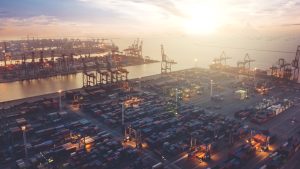On August 25, Indonesia’s Trade Minister Muhammad Lutfi presented his case for the lower house of Indonesia’s legislature, or DPR, to ratify the Regional Comprehensive Economic Partnership (RCEP) trade pact. In his statement to DPR Commission VI, which is responsible for the legislative oversight of trade agreements, Lutfi argued that RCEP will be beneficial to Indonesia, promising to strengthen its role in regional supply chains and improve its economic performance amid the COVID-19 pandemic.
For RCEP to enter into force, at least six ASEAN countries and three partner countries must ratify the agreement through their respective domestic processes. Singapore and Thailand have already ratified it, as have China and Japan, needing either Australia, New Zealand, or South Korea to ratify to hit the mark.
Making the ASEAN tally is more complex, but there are reasons to be optimistic. The Philippines aims to be among the ASEAN-6, having set its process in motion in May. Vietnam was a champion of the agreement, leading to its signing in November 2020. Brunei is chair of ASEAN this year and Cambodia in 2022, giving them an incentive to speed things up. RCEP’s progression toward ratification and entry-into-force under Cambodia’s stewardship would be a desirable outcome for the country.
In Indonesia, RCEP has appeared on the legislative agenda just as the country has struggled with a devastating second wave of COVID-19 infections brought on by the Delta variant. Iman Pambagyo, Indonesia’s former lead negotiator, predicted last year that COVID-19 would be the main barrier to a speedy review of RCEP in the DPR. Despite these odds, international trade is has re-emerged and the DPR Commission is reviewing RCEP alongside the ASEAN Trade in Services Agreement (ATISA) and the Indonesia-Korea Comprehensive Economic Partnership (IK-CEPA). Ratification is in sight.
There is top-down pressure to get these agreements across the line, RCEP in particular. President Joko “Jokowi” Widodo wants to see them done. Indonesia’s presidency of the G-20 next year is fast approaching, presenting an opportunity for the country to burnish its credentials as a global leader prepared to advance an economic recovery agenda. Its own COVID-19 situation does not help, but other areas such as economic leadership are more within the Jokowi administration’s control. Promoting international trade and being seen as responsible for pushing forward a significant trade agreement such as RCEP offers a glimmer in the midst of the pandemic’s gloom.
There are practical benefits for Indonesia in getting RCEP quickly into place. It promises to help integrate Indonesia into regional value chains, attracting more investment and manufacturing jobs. It also aligns with Jokowi’s pursuit of foreign investment in infrastructure and industry. His administration is attempting to establish a domestic battery industry. Successfully incubating this emerging value chain will rely on frameworks such as RCEP, as well as the international partnerships needed to obtain the technology and resources a new industry needs.
RCEP’s next steps will now be directed by the DPR Commission’s deliberations over the coming weeks. Commission VI will review the agreement and statements from the Ministry of Trade and other stakeholders. The Commission will decide which of the two pathways ratification will take: through presidential decree or passage through enabling legislation in the DPR.
The swiftest and most politically certain path is ratification by presidential decree. There is limited consultation and the time frame depends mostly on the president’s agenda. If Jokowi wants to prioritize RCEP, he will expedite this process. He demonstrated his ability to push through trade agreements in 2018 when he authorized the ratification of seven different agreements through presidential prerogative.
But according to Article 84 of Law No. 7/2014 on Trade, the DPR can classify an international agreement under its review as one which has far-reaching implications for broader Indonesian society. If they find this to be the case, then the agreement must go through the DPR’s processes rather than through presidential decree. This process can take longer. Consultations with relevant ministries and two levels of discussions must be held before the DPR’s 575-member chamber can hold a vote on the ratification bill.
Despite how arduous this process appears, it is not a dead-end for trade agreements. The DPR ratified the Indonesia-Australia Comprehensive Economic Partnership (IA-CEPA) in 2020. While there is still a chance that RCEP’s enabling legislation could get stuck in the DPR’s slow machinations – it is not the most productive legislature – the president’s political party coalition controls no less than 80 percent of the DPR’s seats. Even here, Jokowi wields considerable influence over the process and can exert the right amount of pressure to ensure that RCEP’s enabling legislation passes.
RCEP is poised for ratification via either pathway. With this lead time, it is possible to hit Minister Lutfi’s ratification target of January 2022. As ASEAN’s largest economy, Indonesia’s early ratification will improve the outlook for RCEP’s entry into force in 2022. Ahead of the G-20 presidency, this would advance Indonesia’s standing as an Indo-Pacific partner that can advance concrete economic outcomes.

































